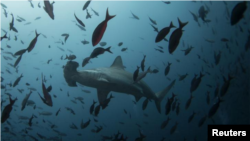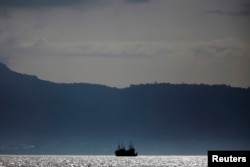Fishing vessels that temporarily switch off a public tracking system raise suspicions that they are hiding illegal fishing, according to the advocacy group Oceana.
Vessel owners say Oceana is relying on the wrong tracking system. They note that government regulators monitor them through a separate, private system.
The automatic identification system, or AIS, broadcasts a publicly available signal carrying the ship's name, location, speed and direction. Its main function is to prevent collisions at sea.
Oceana and partners use it to track fishing vessels and watch for illegal activity. They created the online Global Fishing Watch monitoring system in an effort to increase transparency in the fishing industry.
The new report presents case studies of vessels that turned off their AIS transponders at times that the group found suspicious.
A Panamanian-flagged vessel switched off its AIS at the western edge of the Galapagos Marine Reserve, a protected area where industrial fishing is prohibited, then turned its tracker on again 15 days later, just east of the reserve. The ship then headed for port in Ecuador.
In another case, a Spanish-flagged vessel repeatedly went dark on the border of Gambian national waters, at a time when a European Union agreement barred fishing in Gambia's territory.
"A lot of these developing West African coastal states don't have the resources necessary to really police their waters," said report co-author Lacey Malarky. They rely on AIS data to keep an eye on their waters. "A vessel turning off its AIS is really concerning for them," she added.
AIS may be turned off if the ship's safety or security is at risk, such as in areas where pirates are known to operate.
But the timing raises eyebrows, the report authors say.
Ships should be required to notify authorities when and why they go dark, Malarky said. "There shouldn't ever be a question as to whether a vessel is following the rules because it's shutting off its public tracking system."
Ship owners note that AIS is not intended to monitor fishing activity. Fishing boats are required to carry vessel monitoring system transponders, or VMS, in addition to AIS.
"Our vessel has been and is being monitored 24 hours [per day], 365 days [per year] through the VMS equipment specifically developed for this purpose," said Jon Zulueta, managing director of Atunsa, one of the companies with a ship identified in the Oceana report. "Therefore, the illegal fishing insinuation is malicious and without any basis."
Oceana notes that while national and regional fisheries managers have access to VMS data, it broadcasts less frequently and is not accessible to the public.
The group says governments should require all fishing vessels to carry continuous and publicly available tracking systems.





